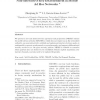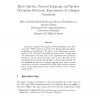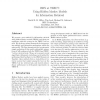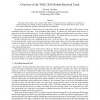ADHOC
2007
13 years 11 months ago
2007
We present a new non-interactive key agreement and progression (NIKAP) scheme for mobile ad hoc networks (MANETs), which does not require an on-line centralized authority, can non...
ADHOC
2008
13 years 11 months ago
2008
This paper shows a novel self-organizing approach for routing datagrams in ad hoc networks, called Distributed Ant Routing (DAR). This approach belongs to the class of routing alg...
GECCO
2008
Springer
14 years 18 days ago
2008
Springer
Bio-inspired ad hoc routing is an active area of research. The designers of these algorithms predominantly evaluate the performance of their protocols with the help of simulation ...
ATAL
2010
Springer
14 years 19 days ago
2010
Springer
In typical multiagent teamwork settings, the teammates are either programmed together, or are otherwise provided with standard communication languages and coordination protocols. ...
TREC
1997
14 years 26 days ago
1997
This paper contains a description of the methodology and results of the three TREC submissions made by the Glasgow IR group (glair). In addition to submitting to the ad hoc task, ...
TREC
1998
14 years 26 days ago
1998
We present a new method for information retrieval using hidden Markov models HMMs and relate our experience with this system on the TREC-7 ad hoc task. We develop a general framew...
TREC
1998
14 years 26 days ago
1998
Experiments relating to TREC-7 Ad Hoc, HP and VLC tasks are described and results reported. Minor re nements of last year's Ad Hoc methods do not appear to have resulted in w...
NETWORKING
2000
14 years 26 days ago
2000
Mobile ad hoc wireless networks are generating novel interests in mobile computing. The dynamism in network topology has thrown up multifarious issues, requiring a fresh look into ...
TREC
2003
14 years 26 days ago
2003
The robust retrieval track is a new track in TREC 2003. The goal of the track is to improve the consistency of retrieval technology by focusing on poorly performing topics. In add...
SEC
2003
14 years 26 days ago
2003
In this paper, we describe why current research in ad hoc networks requires an effective assessment framework, and how our system profile proposal can be used for the purpose. W...




